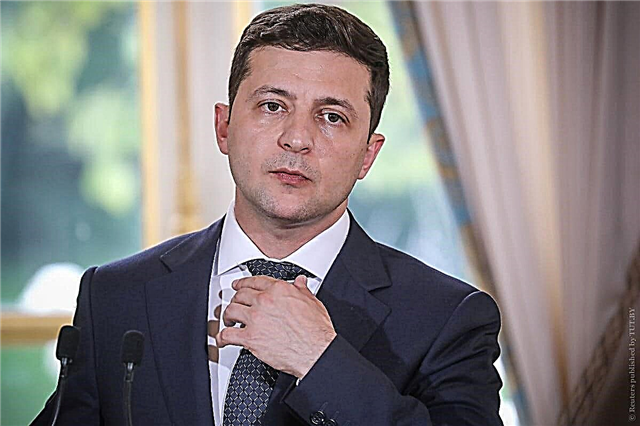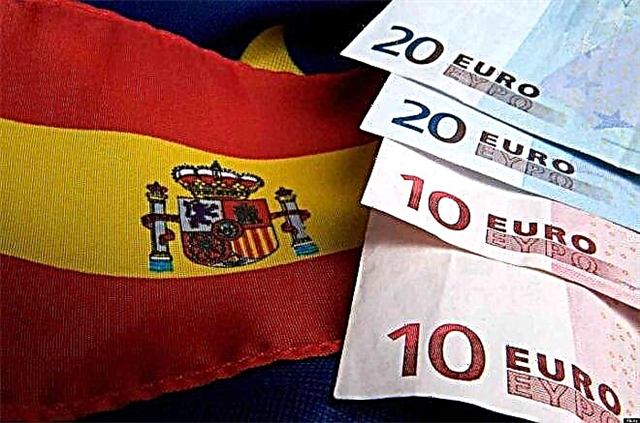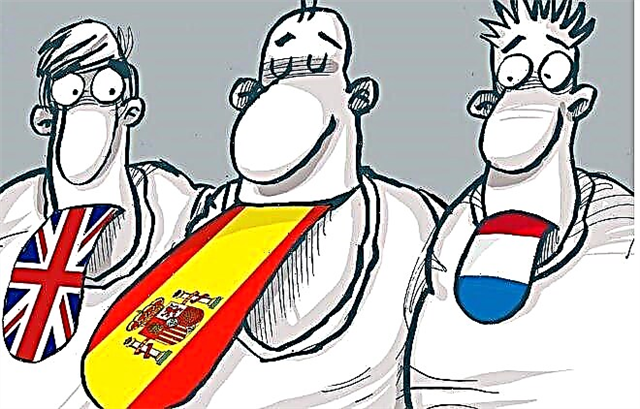Spain is amazing and diverse in every sense. Many national groups coexist here, each with its own customs, cuisine, culture and language. If a tourist who has studied Spanish at home visits Valencia, he will be very surprised, because in this community they speak a special dialect - Valencian. Despite the fact that in Spain only one language is recognized as the official language - Spanish Castilian, there are 4 more semi-official, 6 unofficial and many regional dialects. Therefore, it is very difficult to say unequivocally what language is spoken in Spain.

What is the official language in Spain
According to the Basic Law of the State, the official language of Spain is Castilian (Article 3, paragraph 1 of the Constitution). All citizens are obliged to know it and have the right to use it. It is he who is the main one throughout the country. At the same time, other languages are recognized as official, which are spoken in different autonomous provinces in accordance with their statutes. In general, the linguistic situation in Spain is based on respect for various dialects and their recognition as the country's cultural heritage.
The Castilian language originated in the Middle Ages in the kingdom of Castile, hence its name. In Spain it is called castellano, in other countries the name español (Spanish) is more accepted.
Currently, Spanish is spoken by almost 0.5 billion people on the planet, and it is used as an official language in more than 50 countries around the world.
On the territory of the country, the state language of Spain is used by about 40 million people, its dialects are found mainly in the border areas, where there is a mixture of the two dialects. For example, the following types of Spanish are quite common:
- madrid;
- Aragonese;
- Galician;
- riokhsky;
- Murcian;
- churro.
Since Castilian is recognized as the state language, it is used in the media, on television, for maintaining official documentation throughout Spain. If autonomous communities have a second official language (co-oficial), then local residents, as a rule, use it in everyday life.
Speaking about which language group the Spanish language belongs to, it should be noted that its historical ancestor is Latin. Spanish belongs to the Romance group of languages, the Ibero-Romance subgroup.
Castellano or Espanyol
Oddly enough, but Spain is only the third largest country in the world (on a par with Colombia) where Castellano is spoken. The first two places in terms of the number of Hispanic citizens belong to Mexico and the United States of America.
In the Kingdom of Spain, the Castilian language is the only official language for 11 out of 17 communities:
- Andalusia;
- Aragon;
- Asturia;
- Canary Islands;
- Cantabria;
- Castile-Leon;
- Castile-La Mancha;
- Madrid;
- Murcia;
- Rioja;
- Extremadura.
On the territory of Valencia, Galicia, Catalonia, the Basque Country and the Balearic Islands, other languages are added to the castellano, which are also considered official.
Like all Romance languages (Italian, French, Portuguese, Catalan and Romanian), the native language of Spain owes its origin to Latin, which began to spread in what is now Spain in the late 3rd century BC.
The Castilian dialect became dominant during the Arab invasion of Spain and during the Reconquista period (718–1492), when the power of the Kingdom of Castile increased, which later grew into Castile and Leon. With the development of trade and diplomacy, communications between kingdoms in the 16-17 centuries. castellano spreads in Aragon and Navarre. Internal migration, continuing in the second half of the 20th century, contributed to the expansion of the castellano.
Catalan, Valencian and Balearic dialects
Catalan is the second official language in the autonomies of Catalonia and the Balearic Islands. Its western variant, Valencian, has co-oficial status in the autonomous community of Valencia. The Catalan language has 2 variants: one of them - the central one - is used more by the inhabitants of Barcelona, Girona and the east of Tarragona, the other - the northwest - is the local dialect in Lleida and the western part of Tarragona.
As for which language is more widespread in Catalonia, it should be noted that 54% of the population consider Castellano to be their native language, and only 41% - Catalan.

On the Balearic Islands (Mallorca, Menorca, Ibiza), the eastern dialect of Catalan is widespread - catala balear. It is spoken by 88% of the population. The Balearic dialect has 3 subdialects for each island, all of which also have separate sub-dialects. For example, the local language of Mallorca is called mallorquin or Majorcan. Along with him, Catalan and Castilian are spoken on the island.
In Valencia, Catalan is spoken by 13% of residents, 81% are bilingual, that is, they speak Catalan on a par with Valencia. The language of the Valencia region is regulated by the Valencian Language Academy and has 5 subdialects.
Galician language
The most extreme region, located in the northwest of Spain, is Galicia, which in ancient times was called the end of the world. It is inhabited by a special people - the Galicians, whose dialect is more like Portuguese. Here Galician is spoken more often than Castellano - it is spoken by 61% of the population. Moreover, the villagers prefer the local dialect, and the townspeople prefer the Castilian one. Galician can also be heard in Castile-Leone and eastern Asturias.
The unique language of the Basque Country
The language spoken in the Basque Country is called pseudo-isolated by linguists. This means that its connections with other languages have not yet been established, although there is a noticeable similarity between Basque and Georgian speech. Little is known about the origin of the euskara, as the Basques call their language, but its early form may have been used in modern Europe even before the arrival of Indo-European speakers. This amazing dialect has survived to this day, without undergoing significant changes.
Features of the Aran language
About a thousand years ago, people living in the south of France and the north of Spain spoke the same dialect - Aran or, as it is also called, Occitan. Catalan is one of its dialects.
The Aranian language is now spoken in the Val d'Aran region (community of Catalonia), bordering France. It has a co-oficial status and is studied in schools. 65% of the inhabitants of the Val d'Aran valley speak this dialect, and all the other Arans understand it. At the same time, the Aranians are characterized by multilingualism - in addition to Aran, they also know Catalan, Castilian and French.
Thus, if you count how many official languages in Spain, including Castilian, you get 5.
Other Spanish languages not recognized as official
In addition to languages that have the status of official, unofficial dialects of the Spanish language are also widespread. This linguistic diversity is explained by the presence of many groups and immigration settlements in the country, each of which prefers its own dialect.
Thus, the inhabitants of the autonomy of Asturias, located in the north of Spain, use their dialect Bublé (lengua bable) or asturianu. Its speakers are about half a million Asturians, and this is despite the fact that the Asturian language is considered endangered. Asturianu is spoken and one of its variations - the León dialect - is spoken in some provinces of the autonomy of Castile and Leon.

In the northern part of Aragon and some provinces of Zaragoza, you can still hear the Aragonese speech, which was once widespread in the kingdom of Aragon.At the moment, this dialect is spoken by about 12 thousand people.
It differs from standard Spanish and its southern variety is the Andalusian dialect. It is used in the Andalusian community, Melilla, Ceuta and Gibraltar. This dialect is considered the second largest in Spain in terms of the number of people speaking it.
However, in order not to get confused in linguistic diversity, it is important to remember which language is the state language in Spain. He recognized only one of the languages - Castilian (synonym - Spanish).
In which countries of the world do they speak Spanish?
Despite the fact that Espanyol is the national language of Spain, in terms of prevalence in the world it is second only to Chinese and even ahead of English in the number of people speaking it. It is officially recognized as the second language of international communication. And all because Spanish is the official language in many countries of the world. You will be surprised when you find out about the countries in which Spanish is spoken other than its homeland.
The largest number of Spanish speakers live in Latin America - Mexico, Colombia, Argentina, Venezuela, Brazil, Chile, as well as the United States, Andorra, Belize and some other states.
However, their pronunciation and vocabulary are somewhat different. According to experts, at present, representatives of one Hispanic nation are less and less able to understand the spoken language of another Hispanic nation. Nevertheless, all Spanish speakers in the world are united by the common literary language and the normative Castilian pronunciation (the so-called castellano), which are understood by almost all Spanish-speaking people.
It should be noted that it is much easier for native speakers of español to master the languages of the Romance group, in particular, Portuguese, French and Italian, due to their similarity.
What language should you speak with Spanish
Due to the large number of local dialects, foreigners often find it difficult to communicate with Spaniards. For example, not knowing what language is spoken in Madrid, even a good Spanish tourist may not understand the interlocutor. And no wonder, because the townspeople speak a special Madrid dialect - with aspiration when pronouncing the consonant s, using jargon and replacing some pronouns.
In places that are popular with tourists (cafes, hotels), the staff usually speaks different languages. For example, English in Spain is the second most widely spoken after Spanish. It is freely owned by about 30% of citizens, this is especially noticeable in large cities. Other foreign languages that are popular in Spain are French - it is spoken by about 12% of Spaniards and German - 2%.
Due to the increased number of Russian tourists, menus in many Spanish restaurants and signs in some cities have been translated into Russian. And in Barcelona and Madrid, in some establishments, you can see signs that they speak Russian there. However, if you are wondering if Russian is spoken in Spain, the answer is no. In most cases, Russian speakers in Spain are either tourists or expats.
Summarizing what has been said
Summing up and answering the question of what language is spoken in Spain, it should be noted that on the territory of the Spanish Kingdom, only one language is official - Spanish. The Spaniards themselves call it Castilian for its place of origin. At the same time, 4 more languages are recognized as official on a par with Castellano and are used in some autonomous regions of the country. These are Aran, Basque, Catalan and Galician. In addition, there are many adverbs and dialects, the exact number of which is quite difficult to calculate. Of the foreign languages, many Spaniards, especially young people, speak English, French or German.











